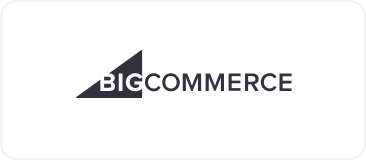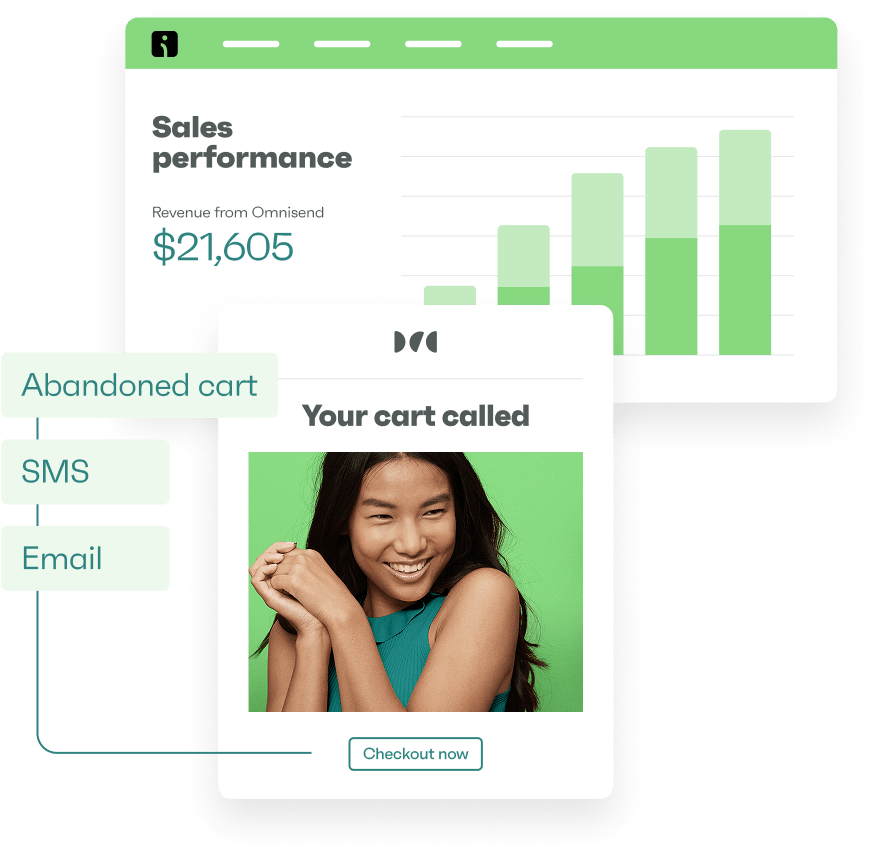Drive sales on autopilot with ecommerce-focused features
See FeaturesRead summarized version with
The ecommerce industry has grown considerably, and many people are pursuing ecommerce business ideas as a way to increase their revenue streams. With advanced technology, global reach, and diverse customer preferences, launching an ecommerce business is more accessible than ever, offering great potential for growth.
In fact, the International Trade Administration (ITA) forecasts a 14.5% annual growth rate for the global ecommerce market through 2026. So, if you’re considering starting an online business, there’s been no better time than now.
In this guide, we’re taking a closer look at 15 profitable ecommerce business ideas for 2026, along with steps to help you get started in the new year.
Quick sign up | No credit card required
Why start an ecommerce business in 2026?
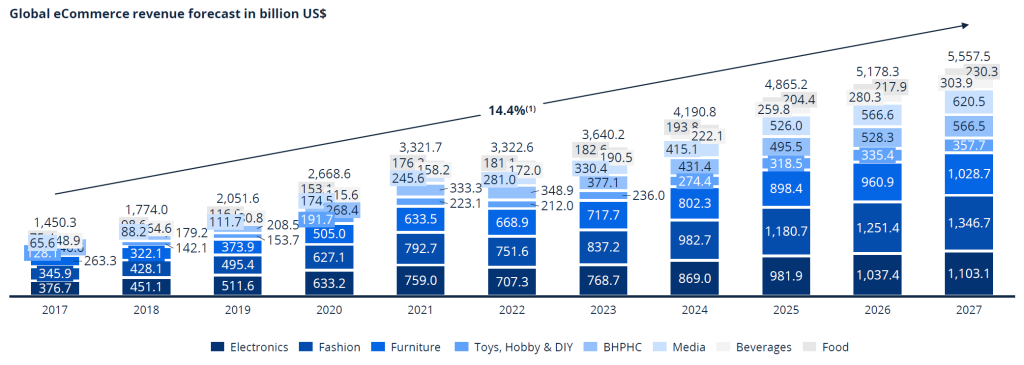
Ecommerce continues to evolve, and virtual selling is proving to be a successful model for businesses across different sectors. According to the ITA, global ecommerce sales are projected to exceed $5.5 trillion by 2027.
And if this potential growth isn’t convincing enough, there are plenty of other reasons why ecommerce is one of the most promising business models to tap into.
Low startup costs
Unlike traditional retail sales, you can launch your ecommerce business with very little overhead.There’s no need to invest in brick-and-mortar storefronts, large product inventories, or even teammates — unless you want to.
Plus, ecommerce tools like Shopify and WooCommerce make it easy to get your business up and running with an initial investment.
Flexibility
If you’re looking for more flexibility in your day-to-day or a better work-life balance, starting an ecommerce business from home could be the way to go. No matter how you choose to grow your business, there are plenty of tools that can help you streamline your efforts (like Omnisend’s email marketing tools), so you can handle continuous business growth effortlessly.
Global reach
One of the most compelling reasons business owners choose to pursue their ecommerce ideas is the ability to reach a worldwide audience. Brick-and-mortar stores rely solely on local foot traffic, but an ecommerce site can attract millions of customers from anywhere in the world.
This global accessibility means you can go beyond the boundaries of geography and open up limitless growth potential. So whether you want to start a side hustle or build and scale a full-time enterprise, ecommerce is a versatile way to achieve it.
Key factors to consider when choosing an ecommerce business idea
Choosing the best ideas for an ecommerce business will be key to your long-term success. Here are some key considerations to guide your decision:
Target market
Understanding your audience is paramount to any successful online business. You’ll need to get a solid idea of who your target market is through research and identify your audience’s preferences, unique challenges, and spending habits.
Initial startup investment
Startup costs can vary depending on the business model you choose. For instance, dropshipping will require a small upfront investment, while ecommerce product ideas that require manufacturing may involve higher costs.
You’ll also need to factor in any expenses, such as website development, branding, marketing campaigns, and inventory, when planning your budget, along with ongoing costs like shipping, platform fees, and paid advertising.
Scalability
Ecommerce ideas you can scale help ensure your business grows continuously with minimum outlay. For instance, digital products and subscription-based services offer recurring revenue and are highly scalable at little cost.
But consider how easily your business can adapt to increased demand and whether you’ll need specific tools to help, such as email automation.
Profitability
Profitability is another factor. High-margin products, recurring revenue models, and low competition can all have an impact on your potential profits.
Passion and expertise in your niche
Building a business around your interests and skills won’t just keep you motivated — it’ll also help you build your credibility and authority. Customers are more likely to trust and engage with a brand that demonstrates genuine passion and expertise.
15 ecommerce business ideas for 2026
Build the most profitable ecommerce business possible with these 15 ecommerce ideas:
- Launch a sustainable fashion brand
- Create and sell DIY beauty kits
- Open a digital art marketplace
- Sell eco-friendly home cleaning products
- Curate niche subscription boxes for hobbies
- Launch a custom sneaker business
- Sell artisanal food products online
- Sell eco-friendly office supplies
- Start a personalized baby products store
- Create and sell upcycled furniture
- Offer custom tech gadget accessories
- Sell DIY home renovation kits
- Create and sell online language courses
- Start a zero-waste product store
- Sell custom-made digital portraits and illustrations
1. Launch a sustainable fashion brand

Overview: Sustainable fashion focuses on eco-friendly materials and ethical production practices.
Market opportunity: Shoppers are becoming more conscious of the impacts of fast fashion, so sustainable clothing has a lot of promise. According to a Global Market Insights (GMI) report, the sustainable clothing market was valued at $3.3 billion in 2023 and is only growing — with a projected growth of 9.5% between now and 2032.
Target audience: Eco-conscious millennials and Gen Z shoppers.
Startup costs: Initial startup costs can be moderate, depending on sourcing and production for your fashion ecommerce store.
Best for: Entrepreneurs passionate about sustainable and culturally-conscious fashion.
2. Create and sell DIY beauty kits

Overview: DIY beauty kits let customers create personalized skincare and makeup bundles with different products, all while shopping online at home.
Market opportunity: Beauty ecommerce is shifting more toward personalization, making this niche rather lucrative. Consumers love the idea of crafting their own products to fit their unique preferences and skin types.
Target audience: Beauty enthusiasts, eco-conscious shoppers, and people concerned about transparency around ingredients.
Startup costs: Startup costs can be low to moderate, depending on product development and packaging. However, partnering with suppliers for bulk ingredients can be a lifesaver for reducing costs substantially.
Best for: Skincare and beauty experts with a passion for industry trends and people with a background in cosmetics, dermatology, or even chemistry.
3. Open a digital art marketplace

Overview: A digital art marketplace offers artists a platform to sell digital artwork, prints, and non-fungible tokens (NFTs).
Market opportunity: The digital art and NFT markets have grown significantly, with blockchain technology and a greater appreciation for digital creativity as the primary drivers.
Target audience: Art collectors, digital creators, and art investors, along with artists seeking platforms to showcase their work.
Startup costs: Starting a digital art marketplace can come with some moderate startup costs, mainly for platform development and marketing. But if you leverage existing NFT marketplaces, you can cut costs and tap into an established audience.
Best for: Tech-oriented entrepreneurs with an interest in digital art and innovation. Having a solid understanding of blockchain technology and digital art trends can also give you a competitive edge.
4. Sell eco-friendly home cleaning products

Overview: Offer sustainable and non-toxic cleaning products for the home and office using a dropshipping model.
Market opportunity: More people prioritize health and sustainability these days, creating an expanding market for eco-friendly cleaning products. Concerns about chemicals in traditional cleaners are also increasing the demand for natural alternatives.
Target audience: Families, eco-conscious individuals, and businesses that want to adopt sustainable practices at home and work. Marketing to parents and pet owners can be especially advantageous.
Startup costs: Low to moderate, depending on product sourcing and development.
Best for: Folks committed to keeping cleaning products as natural as possible. If you go this route, consider showcasing cruelty-free or biodegradable certifications to build trust and credibility.
5. Curate niche subscription boxes for hobbies

Overview: This idea focuses on a general subscription box model but tailors the curated packages to specific hobbies like gardening, cooking, or crafting.
Market opportunity: Subscription services continue to gain popularity because of their convenience, personalization, and recurring revenue model.
Target audience: Hobbyists looking for new tools, materials, and items to add to their collections, use in projects, or refill their supplies.
Startup costs: Can be low to moderate, but like some other ecommerce ideas, partnering with suppliers can help you cut the initial expenses.
Best for: Creative entrepreneurs with expertise in specific hobbies or niches, like sewing or painting.
6. Launch a custom sneaker business

Overview: Design and sell personalized sneakers.
Market opportunity: Customization is a growing trend in the footwear industry, with shoppers looking for more unique and exclusive designs.
Target audience: Fashion enthusiasts, sneaker collectors, and people looking for unique footwear.
Startup costs: Initial costs can be moderate, depending on production methods, sourcing, and materials.
Best for: Designers and shoe enthusiasts with creative vision.
7. Sell artisanal food products online

Overview: Food ecommerce has grown significantly, focusing on handcrafted and locally sourced items, such as candies and confectionaries, cheeses and meats, recipe kits, and seasonal product bundles.
Market opportunity: The demand for high-quality food products is on the rise and can be attributed to the growing awareness of health-conscious shoppers and foodies.
Target audience: Foodies, health-conscious consumers, and gift buyers.
Startup costs: The initial costs to launch an ecommerce business in this niche can be low to moderate. Farmers markets or small-batch production are two options to look into if you’re launching an artisanal food store and want to save on costs.
Best for: If you’re a culinary entrepreneur or just passionate about high-quality food and unique recipes, this business idea might be suitable for you.
8. Sell eco-friendly office supplies

Overview: Provide sustainable alternatives to traditional office products, such as recycled paper, biodegradable pens, and refillable ink cartridges.
Market opportunity: More companies are adopting eco-friendly practices, increasing the demand for sustainable office supplies. Remote workers are also investing in sustainable products for their home offices, giving you plenty of opportunities in this niche.
Target audience: Companies integrating green initiatives, small businesses, and remote workers. Schools and non-profits also make ideal customers.
Startup costs: Relatively low, especially if you choose to dropship products or partner with suppliers.
Best for: Entrepreneurs focused on B2B sales aligned with eco-friendly solutions for the workplace.
9. Start a personalized baby products store
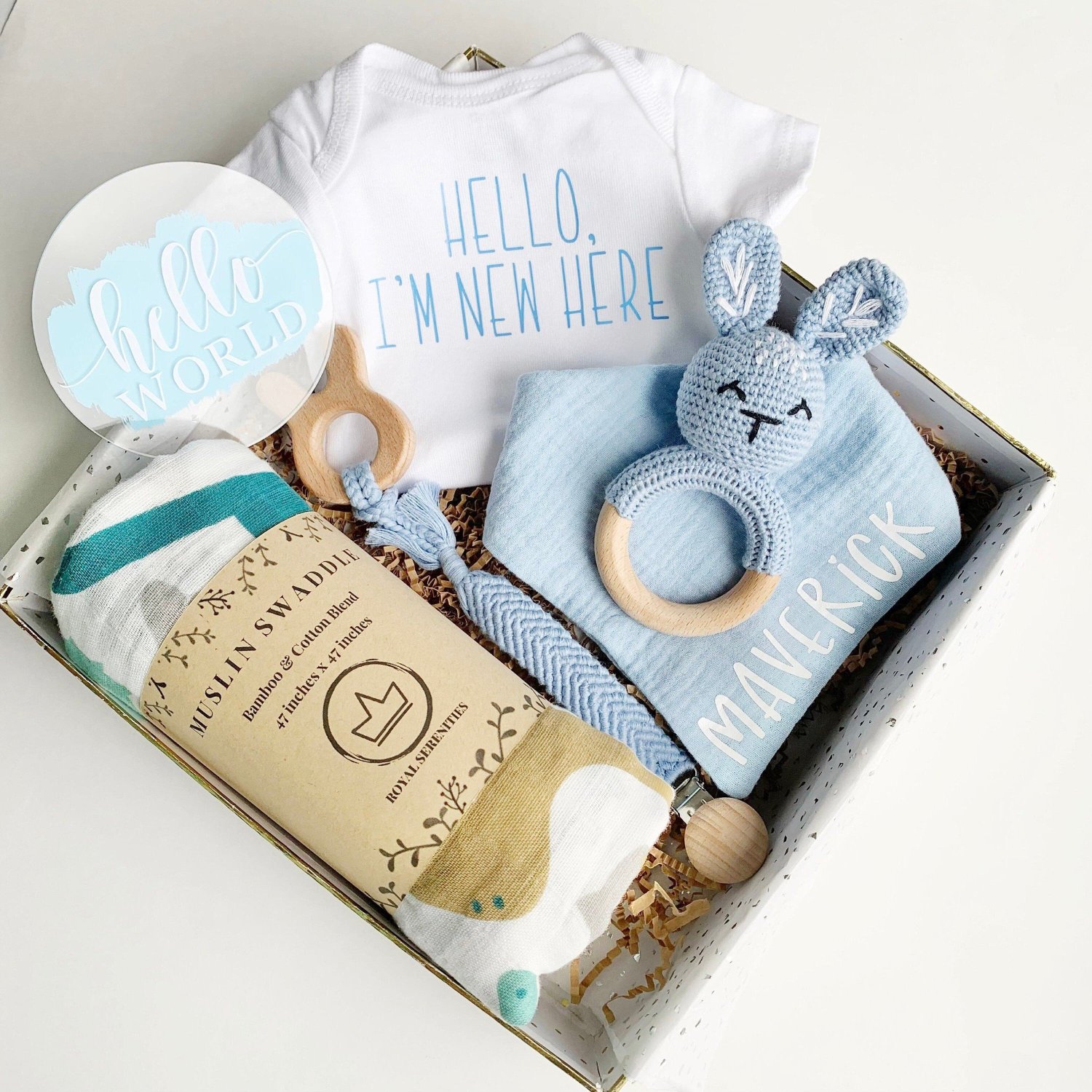
Overview: Offer customizable baby essentials, such as blankets, clothing, nursery items, toys, or other accessories, for new moms and their babies.
Market opportunity: Parents look for unique and thoughtful items for their children, and the demand for stimulating and eco-conscious products is growing.
Target audience: New parents, grandparents, friends of new parents, and gift buyers.
Startup costs: Low to moderate startup costs, especially with a dropshipping model.
Best for: Entrepreneurs with a knack for personalization and who are passionate about providing parents and children with high-quality, personalized items.
10. Create and sell upcycled furniture

Overview: Transform old furniture into stylish, repurposed pieces and sell for profit.
Market opportunity: Upcycling aligns with sustainability trends, and many people are on the lookout for unique pieces they can’t find in department stores.
Target audience: Eco-conscious homeowners and folks looking for unique pieces for their homes.
Startup costs: Moderate, as you’ll likely need the right supplies and materials for your operations.
Best for: Creative individuals with DIY skills or people with a knack for woodworking, building, and constructing.
11. Offer custom tech gadget accessories

Overview: Sell personalized laptop cases, skins, phone cases, and other tech accessories.
Market opportunity: This market is only growing, as many shoppers want more personalized gear for their tech than a “one-size-fits-all” gadget or accessory.
Target audience: Tech enthusiasts and gadget owners.
Startup costs: Low to moderate, especially with dropshipping ecommerce ideas.
Best for: Entrepreneurs and tech-savvy individuals with a creative streak.
12. Sell DIY home renovation kits

Overview: Provide DIY kits for home improvement projects, such as the accessories needed for painting.
Market opportunity: The DIY movement continues to grow along with the costs of labor and construction, so more people are opting for DIY repairs, renovations, and simple updates.
Target audience: Homeowners, house flippers, and DIY enthusiasts.
Startup costs: Costs can be moderate and include expenses for supplies, materials, and sourcing your products.
Best for: Entrepreneurs with construction, design, or extensive DIY experience.
13. Create and sell online language courses

Overview: Offer digital courses for learning new languages.
Market opportunity: The e-learning market is expanding, and many people who want to travel to foreign countries often look for language courses to help them prepare. Students studying foreign languages can also be a potential target market.
Target audience: Students, travelers, and professionals learning new languages.
Startup costs: Startup costs can range widely, from a small initial fee to more significant investments, depending on your delivery. Self-guided online courses can be inexpensive to start, while live coaching or instructional sessions could require more investment.
Best for: Educators and language experts.
14. Start a zero-waste product store

Overview: Sell products that minimize waste, like reusable containers, biodegradable cleaning supplies, and compostable items.
Market opportunity: Zero-waste living is gaining traction as more people are aware of the amount of waste produced by day-to-day items, which means substantial potential for growth.
Target audience: Eco-conscious consumers and shoppers looking for more eco-friendly options for the home that reduce waste.
Startup costs: Low, especially with dropshipping.
Best for: Sustainability advocates and entrepreneurs passionate about reducing the carbon footprint.
15. Sell custom-made digital portraits and illustrations

Overview: Create personalized digital artwork for gifts and decor, including commissioned pieces, portraits, and other media.
Market opportunity: Demand for unique digital content is growing, as is the demand for commissioned artwork.
Target audience: Gift buyers and art enthusiasts.
Startup costs: Minimal to moderate, depending on the technology you choose to use.
Best for: Artists and digital designers.
How to start your own ecommerce business
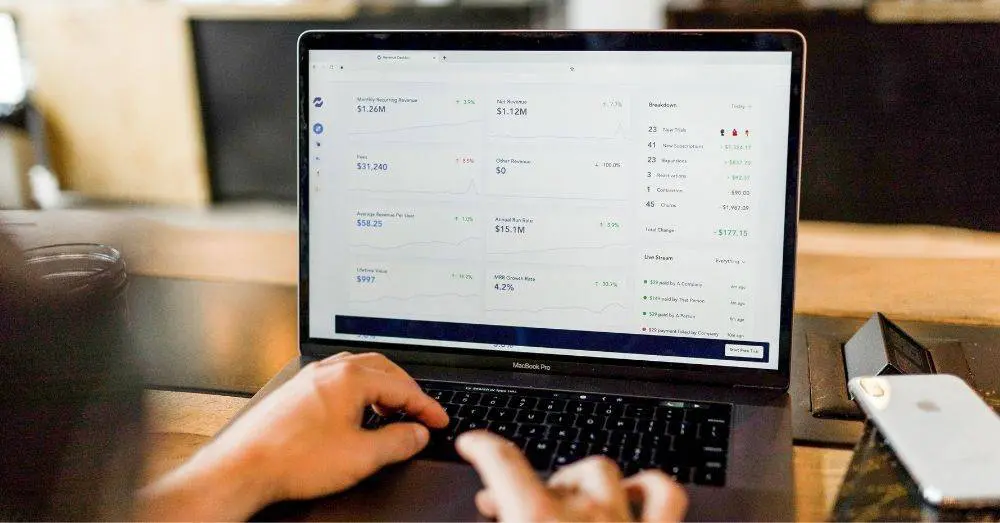
Starting an ecommerce business is easier than you might think. Here are a few steps to help you get started:
- Choose your niche: Identify a market gap that you can fulfill or an area of personal interest or expertise
- Research your audience: Use tools like Google Analytics and social media to identify your audience’s needs and preferences
- Create your online store: Use platforms like Shopify or WooCommerce to design, launch, and manage your online store
- Source your products: Partner with reliable suppliers or create your own products, such as with handcrafted items or artwork
- Market your business: Use social media, email marketing tools like Omnisend, and SEO to attract customers
- Analyze and optimize: Use data you gather about your growth to improve your strategies and maximize profits
Tips for success in ecommerce businesses
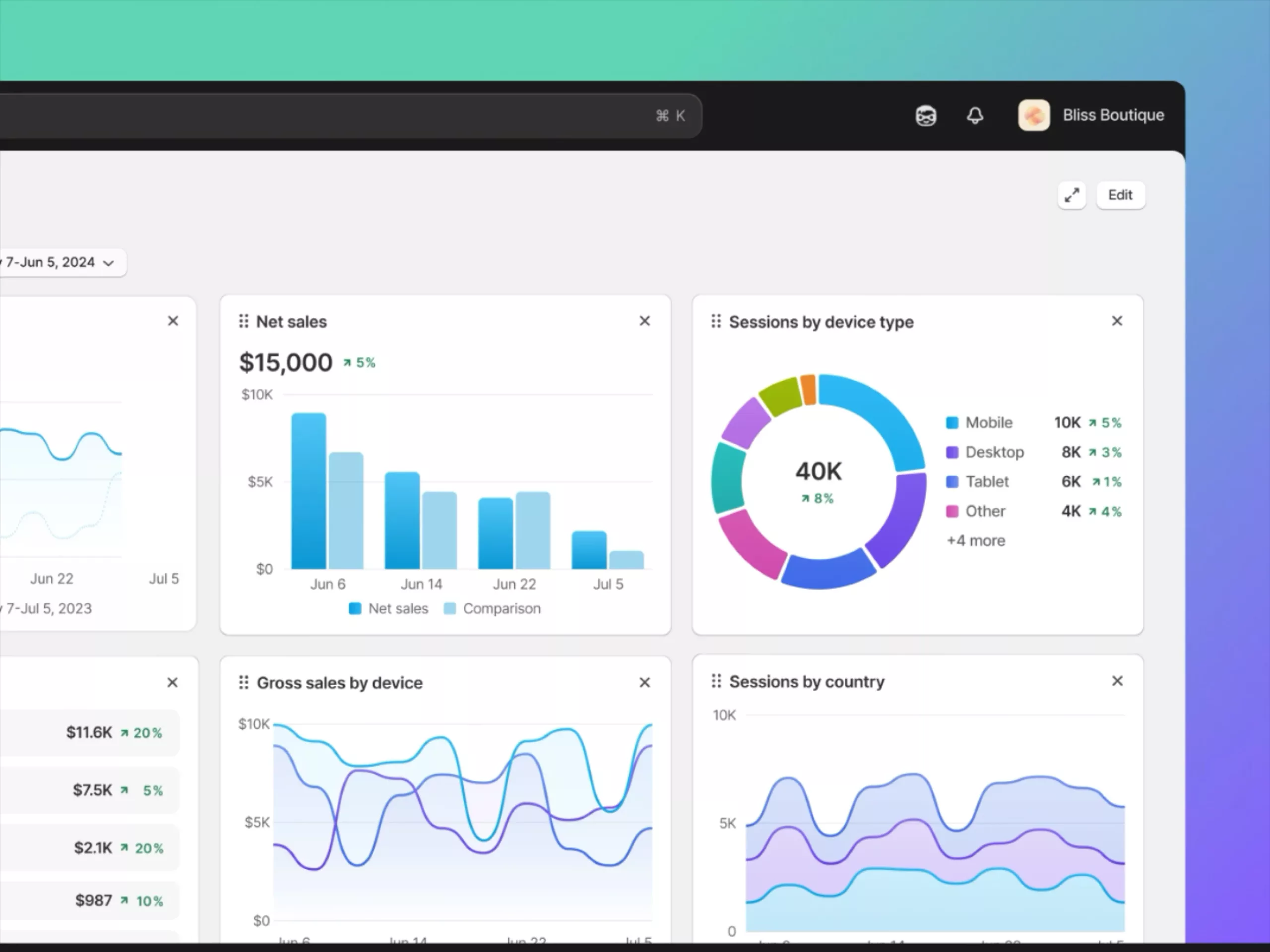
As you launch your ecommerce business ideas, here are some helpful tips to keep in mind:
Use the right marketing tools
Tools like email marketing, social media, and SEO allow you to leverage segmentation and automation to target specific demographics, send timely follow-ups, and recover abandoned carts. Integrating SMS marketing alongside email campaigns can boost customer reach so your brand stays top of mind.
Optimize the user experience
A seamless user experience is essential for converting visitors into loyal customers. Make sure your website is easy to navigate, visually appealing, and optimized for mobile. Features like live chat support and user reviews can further enhance the shopping experience.
Focus on customer service
Build loyalty with responsive and helpful support and provide shoppers with any and all information they would need on a first visit. For example, multiple channels for support, timely responses, and a comprehensive FAQ can all go a long way toward boosting customer satisfaction.
How Omnisend can help ecommerce businesses grow
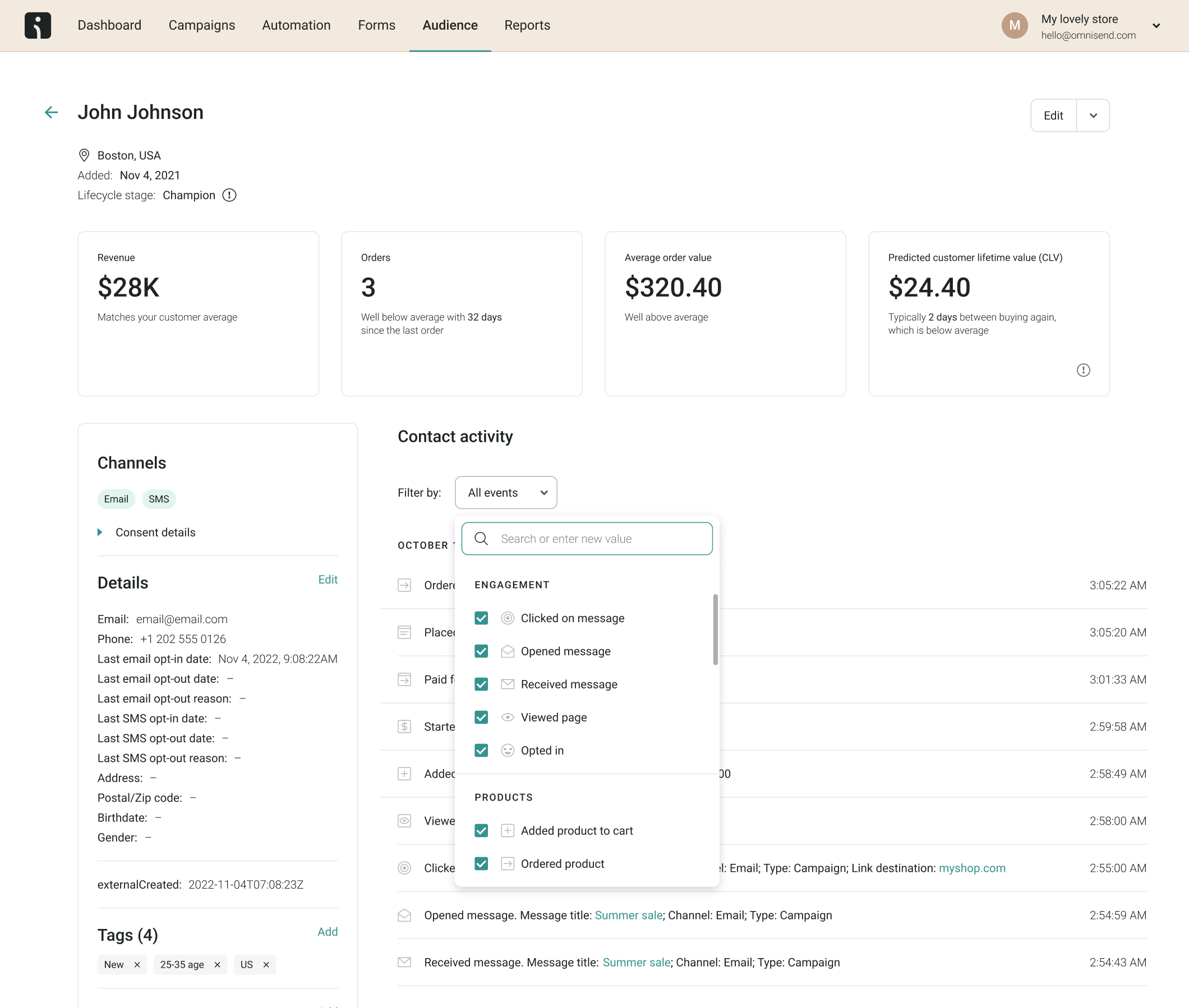
Omnisend offers both free and paid plans for ecommerce businesses to streamline their digital marketing efforts. Through robust email and SMS marketing solutions, Omnisend makes it powerful without being clunky to plan, launch, and track your ecommerce marketing.
Here are several ways in which Omnisend can help your ecommerce business ideas grow:
- Email and SMS marketing: Omnisend’s SMS and email marketing tools are straightforward enough for beginners but advanced enough for seasoned pros to engage customers through personalized messages and product reminders
- Automation: Omnisend helps ecommerce businesses save time with automated workflows for abandoned carts, welcome emails, and SMS messages — plus, you can use A/B testing to monitor and improve performance
- Advanced analytics: With Omnisend, you get analytics that help you monitor performance so you can continue refining your campaigns
- Seamless integrations: Omnisend also provides integration with popular platforms like Shopify and Wix, making it easy to streamline your efforts and monitor everything in one spot
- Live chat and email support: Omnisend provides 24/7 live chat and email support, giving you all the tools and resources you need to grow your ecommerce business
“Our order confirmation automation alone has become a powerful revenue driver, showing us that even post-purchase messages can contribute to sales. But also, we see that overall automations not only drive sales but help us understand what our customers need as well. This builds loyalty and retention, which are vital for a brand like ours.”
Jacqueline Love
Ecommerce and Wholesale Manager at Rachel Riley
Read the full success story here.
Conclusion
If you’re looking for a new venture, there’s no better time than now to tap into one or more of these profitable ecommerce business ideas. Many of these ecommerce industries are growing rapidly, giving you plenty of ways to create substantial income.
With the right ideas and resources, you can build a successful online business — whether you’re following a dropshipping model for an eco-friendly products store or creating handmade items customized for each shopper. And with Omnisend, you’ll have the tools you need to continue growing your business long term.
Quick sign up | No credit card required
Ecommerce business ideas FAQs
The most profitable ecommerce businesses usually target high-demand niches with low competition, such as sustainable products or personalized items. Similarly, subscription-based services and digital products are also quite profitable.
The best business aligns with your interests, expertise, and market demand. Ideas like digital courses or subscription boxes are great starting points. Additionally, tech, print-on-demand, and food items are good starting points if you’re just building on your ecommerce ideas.
Ecommerce typically covers business-to-business (B2B), business-to-consumer (B2C), consumer-to-consumer (C2C), and consumer-to-business (C2B) models.
Focus on business models like dropshipping or print-on-demand, where you don’t need to hold inventory upfront. Use free website-building platforms, social media, and compelling content and listings to attract customers without significant upfront costs.
TABLE OF CONTENTS
TABLE OF CONTENTS


No fluff, no spam, no corporate filler. Just a friendly letter, twice a month.

 OFFER
OFFER


